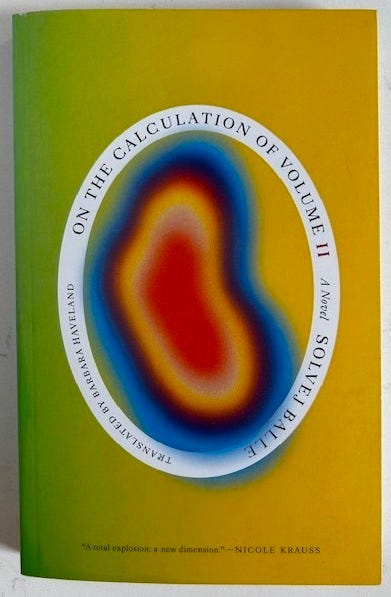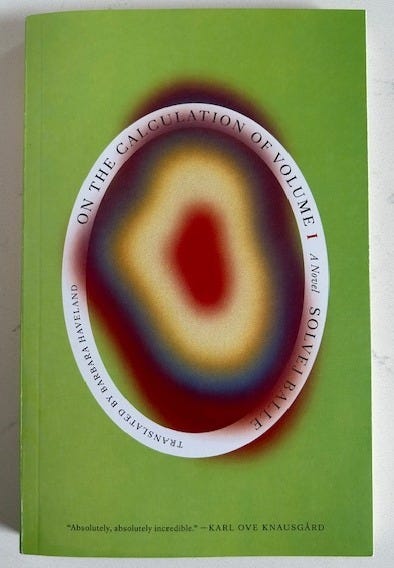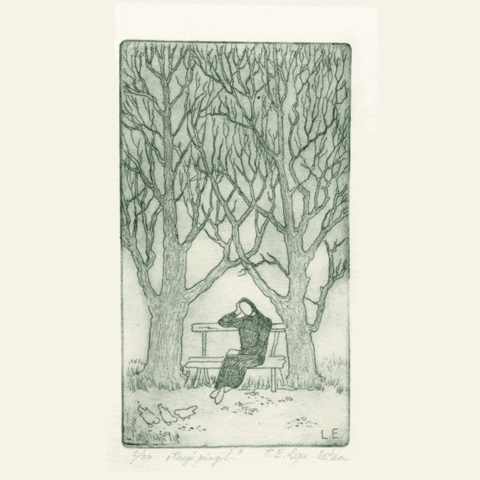'On the Calculation of Volume,' Books I & II, by Solvej Balle
'Thomas was caught in eternity and I was slowly but surely moving toward my grave.'—Review #253

Do songs ever pop into your head while you’re reading a book? I had a mini jukebox going in my mind as I read the first two volumes of Solvej Balle’s seven-part novel, ‘On the Calculation of Volume.’ The first installment of the series has been longlisted for the 2025 International Booker Prize and for the 2024 National Book Award for Translated Literature, and the remaining five have yet to be released in English. But Balle’s books seem to be popping up everywhere. Several of my newsletter friends have just bought one, are reading them this month or have already written about them.
and I were doing a read-along, and you can see her take early next month. I initially had no idea what the series was about or that there was more than one book. I bought the second one first, thinking it was the only one, so I had to get them both. I was attracted to their unusual and colorful cover designs, and the title made me think of turning up a stereo.Here are the books’ covers:

The first song that popped into my head was:
Kate Bush sings about a recently deceased woman’s ghost who returns home to visit her spouse. He can’t hear or see her, and he seems to not yet be aware that something terrible has happened (the lyric ‘I should have been home hours ago’ is haunting). As the novel begins, we meet Tara Selter, who has been living for weeks in the guest bedroom of her home in rural France, hiding from her husband. He thinks she is in Paris, on a trip to visit friends and to acquire items for their antiquarian book business. What he doesn’t know is that something happened to Tara on that trip. She somehow slipped out of time and has been reliving a specific date—Nov. 18—over and over. Tara seems to be moving forward in time normally; her hair grows, she retains her memories and the burn she got after touching a scalding-hot heater slowly heals. But everyone and everything else resets back to the beginning of Nov. 18 every night. The friends she sees on one Nov. 18 have no memory of her visit on the next. She sees the same person drop their toast at breakfast, day after day. A Roman coin she buys that day disappears the next morning—it has returned to the shop as if she never purchased it. She’s trapped in a loop, like:

Tara calls her husband, Thomas, and tells him what happened. He vows to help her, and she quickly returns home. But the next morning, he is surprised to see her as the previous day’s events have been erased from his mind. She explains the issue to him again, but the following morning he’s back to square one. One time, after Tara reexplains things to Thomas, he stays up with her all night to see if they can push through to Nov. 19. As they’re sitting and talking at the kitchen table in the dead of night, Thomas suddenly becomes startled and agitated: How did he get into the kitchen? Where did Tara come from? She’s supposed to be in Paris! Tara realizes the situation is hopeless, and she retreats to the guest bedroom where she starts a journal—it beings on the 121st Nov. 18. Tara is forced to live like a ghost, and she moves around the house only when Thomas isn’t there, like:

The second song that popped into my head was:
From her hiding place, Tara hears her husband’s repeated movements day after day—to the bathroom, to the kitchen to make tea, playing music in the living room, going out to do shopping and coming back, and stepping into the garden to pluck a leek for dinner. Always in the same order, always at the same time. She also realizes that despite the time loop, she is making an impact on the world around her. Books she buys remain with her if she sleeps with them under her pillow. Food she’s eaten does not return to market shelves. A leek she digs up in the garden does not regrow. She thinks of herself as a monster, a destroyer of the world, and realizes that her situation has once again become untenable. She cannot stay in the guest bedroom if she’s ever going to figure out what’s happening to her and break out of the time loop. She’s like:
That’s all I’m going to say about the plot of the first book because it ends on a cliffhanger. I won’t say much about the second book, either, other than three quick points. ⚠️ EXTREMELY LIGHT SPOILER ALERT! ⚠️ First, Tara’s journey continues as she searches for ways to structure her new reality, particularly around:
Second, this novel also ends with a cliffhanger. Third, it made me think of this song:
How is Tara gonna get through? I have no idea, but I’m having fun speculating. Will she meet others in a time loop like her? Will she take to a life of crime since before anyone gets on her case it will be Nov. 18 again? Will she have a brush with death? Can she die? Whatever the case may be, it will take us years to find out. Book III and Book IV are due out later this year. Can you guess the proposed release date? Yep, it’s Nov. 18. I’m like:

I will be among the first in line to pick up the next installments because I must know where this story is going and what Balle is trying to tell us. ‘On the Calculation of Volume’ seems to be shaping into a profound meditation on the loneliness of human existence and the existential malaise wrought by the modern cycle of eat, sleep, work, repeat. Our relationships with others—spouses, friends, family and lovers—provide only brief respites from the boredom and alienation of modernity, and are themselves undermined by repetition and habit. The magic fades, bonds break and people drift. Like Tara, we are in a push-pull struggle with patterns. There is safety in routine, of course, but it also can be a prison. Is breaking out of it just another prison? Balle asks us if we really want to be free. And if so, what then? How do we deal with the consequences? Will we miss the yoke of domesticity and career? And as the title suggests, the novels also force us to reckon with how much space we take up in the world. Are we monsters, as Tara views herself, who impose ourselves and only take and take? Or should we retreat, creating space for those around us by seeking solitude? Can there be a balance? Thinking about this is making my head spin like:

I loved these bleak and beautiful books. ‘On the Calculation of Volume’ books I and II are fascinating and riveting—I couldn’t put them down. Balle’s writing is efficient and engrossing, and, one time, while reading on the train to work, I was so locked in that I almost missed my stop. I know that everyone might not be up for a seven-book journey, but if you’re up for following an epic quest for meaning, you should definitely check out Balle’s books. Her work is among the best fiction I’ve read this year, and I highly recommend it.
An opening excerpt:
There is someone in the house. Heard as he moves around the room upstairs. When he gets out of bed or when he goes down the stairs and into the kitchen. There’s the gush of water through the pipes when he fills a kettle. The sound of metal on metal when he sets the kettle on the stove and the very faint click when he turns on the gas. Then there’s a pause until the water comes to a boil. There’s the rustle of tea leaves and paper as first one, then another spoonful of tea leaves is taken from a paper bag and poured into the teapot, then the sound of water being poured over the tea leaves, but such sounds can only be heard in the kitchen. I can hear the fridge being opened, because the door bumps against a corner of the countertop. Then there’s another pause, while the tea steeps and in a moment I’ll hear the chink of a cup and saucer being taken from the cupboard. I don’t hear the sound of the tea being poured into the cup, but I can hear footsteps moving from the kitchen to the living room as he carries the cup of tea through the house. His name is Thomas Selter. The house is a two-story stone cottage on the outskirts of the town of Clairon-sous-Bois in northern France. No one enters the back room overlooking the garden and a woodpile.
It is the eighteenth of November. I have got used to that thought. I have got used to the sounds, to the gray morning light and to the rain that will soon start to fall in the garden. I have got used to footsteps on the floor and doors being opened and closed. I can hear Thomas going from the living room to the kitchen and putting the cup down on the countertop and before long I hear him in the hall. I hear him take his coat from its peg and I hear him drop his umbrella on the floor and pick it up.
Once Thomas has gone out into the November rain there is silence in the house. Broken only by my own sounds and the soft patter of rain outside. There is the scratch of pencil on paper and the scrape of the chair on the floor when I push it back and get up from the table. There are the sounds of my footsteps as I cross the room and the very slight creak of the door handle when I open the door into the hall.
My rating:

‘On the Calculation of Volume’ (Om udregning af rumfang) book I was published by Pelagraf in 2020 and by New Directions in 2024. 161 pages. $14.83 at Bookshop.org. Book II was also published by Pelagraf in 2020 and by New Directions in 2024. 185 pages. $14.83 at Bookshop.org. Both novels were translated from the Danish by Barbara J. Haveland.
What’s next:
Books on GIF does not solicit or accept review copies. We feature books we purchase at independent bookstores around New York City and on our travels, or were borrowed electronically from the Brooklyn Public Library.
Before you go:
ICYMI: Review #252
Read this: The Wall Street Journal has a very interesting article (subscription required) about artist Egon Schiele: ‘A Secret Baby and a Nazi Hospital: The Untold Mystery Upending an Artist’s Legacy.’ It explores how the recent discovery that the artist had a hidden-away niece re-contextualizes some of his famous works.
Read this, too: The Dirt has a piece about how Barnes & Noble is turning into McNally Jackson.
Do this: Speaking of McNally Jackson, the next installment of ‘Unusual Appetites Book Club with Melanie & Quinn’ on April 14 will feature the latest novel from
: ‘One or Two’ by H.D. Everett. The event is at the Williamsburg branch at 7 p.m. Donna and I will be there! (Also: McJ’s ‘International Literature Book Club with Yvonne’ is discussing ‘On the Calculation of Volume’ Book II at its SoHo branch on April 7 at 7 p.m.)If you enjoyed this review:
Thanks for reading, and thanks especially to Donna for editing this newsletter!
Until next time,

MPV











I was really looking forward to this post, Mike! I co-sign on your description of the evocative nature of this book. It has stayed with me since I read it and I do catch myself thinking about where it may be going… but I feel like the point of it is to accept that there is no resolution to the mundanity of life, to the micro-aggressions of daily existence, to the eerie cruelty of marriage… You just wake up one day and SEE it, while those around you may or may not be on that same wavelength as you.
I really love that Kate Bush song! It is a perfect companion to this book. I have still not been able to make myself reach for vol 2. 🙈😅
I love how we're all On The Calculation of Volume train! I skimmed the last part as I am reading vol 2 right now and did not want to risk seeing something! I haven't read a series this long since I was a child - but I am here for anticipating the final 5 books!